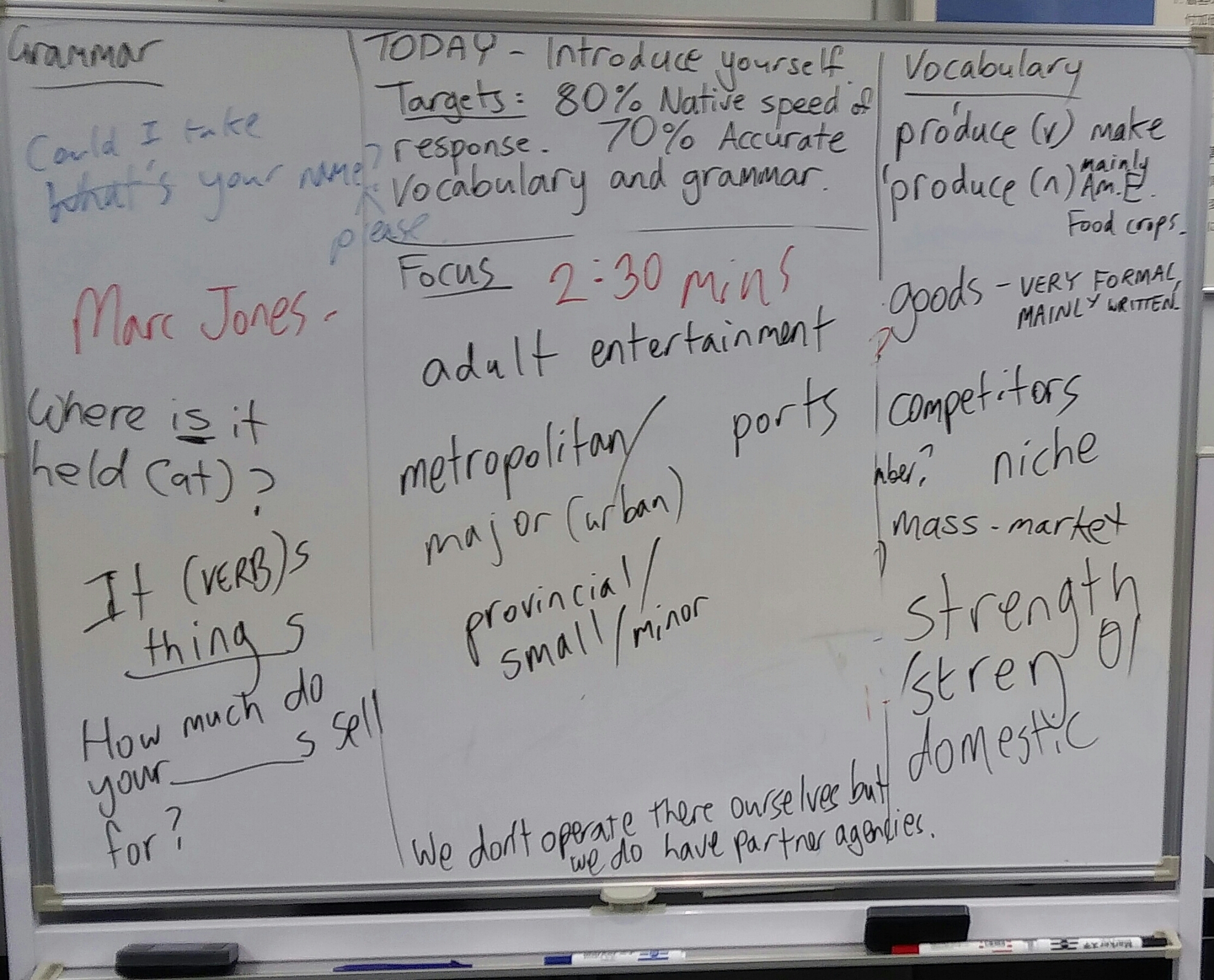Recently it feels like I have been taking part in a lot of research projects. I don’t think I have, not when I sit and count, but it feels like it. It could be a massive pain in the bum but I actually like it.
For one thing, other people’s research about teachers and/or teaching is unlikely to align exactly with one’s current wondering about teaching. This is likely to cause one to consider one’s classroom practice, beliefs or CPD process more deeply than before. Another thing is that when you are stating practices or beliefs, you’re making it coherent because you don’t want to be “Well, I don’t know why.” Although I am sure that I have screwed up my face on Skype while searching for answers in the back of my mind.
Next time you see a survey circulating on social media, why not have a go. Help build our body of knowledge. And help find the figurative lost bit of jigsaw puzzle of your mind from under the sofa.
 Author: Marc Jones
Author: Marc Jones
Here be (Dungeons and) Dragons 1
First day back at A University Outside Tokyo today. All new courses as I decided to rewrite the one course that was the same.
Anyway, I have a course for repeating students. I requested this for the challenge and thought it would give me a chance to try new things to up motivation.

15-week role-playing game based roughly on a Dungeons & Dragons-type game mechanic? Based on welcoming an exchange student? Let’s enter the dungeon.
It’s very much a Role Playing course, with a minor game put in. It’s sort of a hybrid of Daniel Brown’s EFL RPGs and James York’s Kotoba Rollers framework. The students have (electronic) portfolios to submit, which should include audio recordings of role plays, transcriptions of part of that audio, vocabulary and grammar notes.
It’s just the first week but the students seem relatively enthusiastic, especially with the 20-sided, 10-sided and 4-sided dice.
The non-player characters (exchange students, parents, etc.) are not played by a Dungeon Master (teacher) but by the students and decided by values of dice rolls. There is a bit of task planning, task recording and task reflection, as well as focus on form reactively.
I still need to work in more about the strength, courage, observation and stamina points more clearly in my mind but at least it wasn’t rejected point blank.
Read Here be (Dungeons and) Dragons future’chapters’: 2, 3, 4, 5, 6
Hyperreality: The failure in the park didn't happen

The title of this post harks back to my BA Film & Media Studies days at Sunderland, when we were assigned a reading by Jean Baudrillard about how the media portrays (or just doesn’t report) events has ramifications upon the perception of them.
What the hell are you talking about, Marc?
Bear with me, because hopefully it will be worth it. I organised the ELT freefor(u)m Tokyo on Saturday thinking I might bring about a little bit of knowledge sharing and a little bit of solidarity to language teaching. Of course it was a bit daft to think that some people would turn up to the park on either a day they are working or a day when they are off work with families or friends. It seemed to have a lot of support on Twitter. Elsewhere. Not in Tokyo.
Now, if I had dressed this up as a rampant success, would this have made the next one (and there probably will be another one after I have a really long hard look at myself in the mirror and listen to Denzel Washington’s “it takes a wolf” speech from Training Day or something) be even more successful and less of an outlandish prospect? I don’t know. I do know that Anna’s Reflective Practice group gets more than zero people going to it, but that’s after work. My after work is usually ludicrously late, and my not at work is the start or middle of other English teachers’ days.
Anyway, what I did do was be honest: it was not even a one-man-and-his-dog audience (actually, audience is a misnomer because this was supposed to be a crowd thing, in person, and grassroots and other hippie-centric words). It was the flipside of every cool, loner fantasy. Sitting in a park, with a sign, hoping that people would come. I gave it an hour and then buggered off to get coffee and read without needing to wear a jacket. It was less successful than a freeform jazz odyssey. I licked my wounds and sulked.
So, the point, Marc?
The point is that if you have harebrained ideas that involve people you need to get actual commitment from them, and you know, you could dress it up and not have a failed project in your results when people Google you, or you could try and learn from it even though you get massive bruises on your ego and feel like an arse for wasting your time and energy.
I got loads of feedback from my lovely Twitter network, including some awesome, detailed feedback from TaWSIGgers – and maybe this idea has legs, maybe elsewhere, maybe another day or time. If it doesn’t, well, even though the first Gulf War never happened, everyone is quite aware that the second one did, aren’t they?
So, what’s next?
Keep on with this, I think. I’ve been told not to give up, so I figure, if there’s still absolutely nobody by the third try, it’s not going to be me doing it. I need help; help might even be on the way. So although I deleted the ELT freefor(u)m blog in a tantrum, it’s not quite as moribund as it might seem.
Positive Steps (Vanguards Wanted)

I’ve been, and still am, disillusioned with the industrial side (as opposed to the professional side) of English Language Teaching. This includes lack of professional development, overbearing influence of coursebooks and the massive global ELT publishers, deskilling by publishers and large chain schools and precarious working conditions. I’ve always tried to avoid being a naysayer in that when I’ve said ‘nay’, I hope that there’s at least one alternative proposed. Being that I believe action is necessary, I am going to propose action that sympathetic parties may wish to follow up on.
Work in loose, broad-church, accessible Special Interest Groups (SIGs)
IATEFL and TESOL International do not have the monopoly on operating SIGs. There is TaWSIG but other than that there are others that are SIGs by nature if not by name. The Dogme in ELT forum was such a thing. TEFL Equity Advocates is another. There is also ELT Advocacy Ireland, the Women in ELT group on Facebook, The C Group, and I suppose what we at #TBLTChat have been trying to do and what TLEAP are doing.
Realise it’s a broad church and many people do a range of things with varied experiences and dialogue can help us grow through shared practices, ideas, stories and knowledge. This then creates a culture. What do you care about? What are the itches you’re not getting scratched? Are there people who’ll do this with you? You don’t have to have a lot of people to start with; summoning shared energy shouldn’t be a problem.
Don’t Like Something? Make Something Else!
Don’t like textbooks? Try materials light teaching or making your own materials. Tell others.
Are listening materials rubbish? Could you make your own website? Tell others.
Do you hate this blog or feel it neglects things things? Make your own. Tell others.
We can, and I am reluctant to dictate but we should try to make the world how we would like it to be rather than settling for how it is. This change will not come easily but nor will it fall in our laps automatically without any kind of effort being applied.
We are all polymaths. We all have other skills and interests that can be brought together to build a better environment.
Commit but See Other People
You have your ideas and interests and you are what you are because of them. With other people’s knowledge and skills you can build further and better than you might otherwise do alone. Your loose, broad-church SIG can only benefit from outside knowledge and expertise.
Some of this, at least initially, may involve working for free
However, the beneficiary of this free work is you and your community, so you aren’t slaving away for someone else. You may even be able to make money from it later because people don’t mind paying for things with value, they just mind being ripped off. You then have a model, with this work, of how things could be. This might take reiteration. Keep looking, even if there are faults. Someone, somewhere might benefit.
Hopefully this is good for thought for some of us about our place in the world and gives us a more positive idea of where we might go next.
I’d love comments here, especially if you use the comments to build your own SIGs.
The Great Gig Economy in the Sky
Cool Lone Wolf Fantasy

The ‘Gig Economy’, or as it used to be known ‘making people wait till you throw them some crumbs’ is one of the continuing shames of our profession. Casual work, often without contracts, with no holiday pay, sick pay, parental leave or any of the other benefits full-time workers enjoy is promoted as freelance work, with that kind of cool image of Tribeca loft apartments and commuting between clients on a bicycle with the wind in your hair. Not for us the waiting outside a meeting room, a bag of books, folders and papers hanging off us, eh?
I know that when I started freelance work and serial part-time work it was to do with better rates of pay. It’s always about better rates of pay. Working full time in a language school wasn’t going to pay enough to support a family. Yet two of the biggest providers of work for me for agency work are language school companies. The full-timers making about ¥2500 per hour get holiday pay and better health insurance and hybrid state and company pension. I forego those benefits to pay my own insurance and state pension but get more money.
This might be decried as me just having a moan, having cast myself as a Job-like figure of TEFL in Japan. Not quite. I earn decent money. What I’m complaining about is this:
If the same company can afford to pay ¥4000 per hour for very precarious conditions, or ¥2500 (or less) for less precarious conditions for the same work, isn’t it true that they can probably afford to pay the full-timers more or give freelancers less precarious work?
This is before anything like qualifications and experience are taken into account, and generally in Japan, they aren’t taken into account very much at all.
“Oh, but with the gig economy you’re free to do whatever you want to do. Freedom is good!” I imagine people saying.
I say it is not. I say that you’re probably just as beholden to work with the gig economy or even more so because of a fear that work could dry up leaving you wondering if you could adjust to a hunter-gatherer lifestyle. It’s all about control. Full-time leaves you beholden, freelance leaves you grateful for anything that comes your way. I’m lucky, because now I get none of my work through any of the Uber-for-EFL sites which have the flakiest students who want amazing, bespoke lessons for basically nothing, along with the right to cancel at a minute’s notice (and I am not exaggerating) with no fee.
What are the alternatives?
It may not seem like it, but there is a tiny sliver of light in the unrelenting darkness. There are communities that we make ourselves. Worker-owned cooperatives are the model that I think would be best, but this isn’t easy to sort out when you’re stretched with work already. Just knowing that somebody has your back is enough on some days; on others you need sick cover or a bit of help making some materials that you can’t actually find.

We need less of the rampant individualist and more small-scale collectivist behaviour. Know yourselves, your strengths and weaknesses. We need to work together, help each other and pool our labour to stop large operators being the only option. Otherwise we keep the status quo: TEFL elites writing million-quid coursebooks, junkets to large conferences and people from supposed non-profit organisations who haven’t taught in donkey’s years being paid ten times more than you to tell you about your classroom practice.
Needs Analysis for People Who Don't Know Their Needs
“What do you need to do?” the teacher asks.
“Um, speak English,” the most outgoing student says.
“In what kinds of situations do you use English?”
“Business situations.”
So, not the most illuminating of exchanges to help plan a curriculum. There have been loads of times that this has happened to me, and to others. There’s a lovely post by Laura at Grown Up English about negotiating a task-based syllabus. You might also want a look at #TBLTChat 7 on syllabus design. Here, I’m going a bit hybrid.
With this group of learners I’m going to talk about, I asked their goals and what they usually use English for at work. I got that they want to work on fluency in speaking and listening, on the phone and face to face. There were no concrete situations, though.
Due to this, I get to use my imagination and have a bit of a daydream about other people’s work. Maybe this is due to too much Quantum Leap (“Oh, boy!”) as a boy. Not having the luxury of shadowing the students to find out about a typical day, I can only rely on what they tell me or what I can anticipate.

This board was based on my guesses what the students in this group might need based on knowledge that they work for a logistics services provider. I had the students in the group, of mixed level, rank the things that I chose according to how important they are.
It was interesting to find that answering complaints was not seen as important. I’ll leave this open for the rest of the course. It was also interesting to find that I don’t need to prioritise simple scheduling very highly. This means I’ll conflate the scheduling and queries lessons, with a bit of wriggle room by adding other things and renegotiating the syllabus again.
I leave one slot at the end for review or covering what crops up and then this is our syllabus for the rest of our 10-hour course. If you have any other ideas, feel free to share them in the comments.
New project: ELT freefor(u)m Tokyo
This new project is a non-internet project. ELT freefor(u)m Tokyo is something I aim to be a grassroots meetup of English language teachers in Tokyo to talk about working conditions, professional development and be a bit more ad hoc than a conference and be a no-budget and hopefully sustainable thing.
Come along. Have fun and take the reins of your professional development.

All Talk & No Action in ELT?
Hamstrung by Money
This weekend was the TESOL Summit in Athens, and like many an ill-advised corporate venture, it was hashtagged to encourage (token) engagement from stakeholders to give (the illusion that) teachers have a say.
The problem is, the last time I looked Pearson isn’t a teacher, nor is Cengage: they are materials developers who make money from coursebooks and so have an interest in keeping teachers deskilled so that language-teaching organisations can implement a Fordist-Taylorist employment structure where any worker is immediately replaceable. If you will, it’s taking the skilled craftsperson and putting them at the same level as someone trained to tighten four bolts with a ratchet 75 times a minute. The British Council, a corporate entity masquerading as a quasi-governmental body (or the other way around) is one of the sponsors. The same British Council who implements observations of various language centres across Britain but also competes with other language centres overseas. (I’m not anti-BC teacher, by the way. There are great people work for the organisation. I’m anti-BC corporate operations. Why are they corporate when they are a branch of the British government?)
There’s a lot going for the TESOL organisation: they do come out and try not to sit on the fence about matters that concern teachers. To what extent are they hamstrung by their need to rely on sponsorship to gather large numbers of people together? That’s not for me to judge for you but for me to judge for myself.
An alternative to the talking shop?
So what can we do apart from have big groups like IATEFL and TESOL pretend to advocate for us teachers but actually advocate for people working for corporate interests that sponsor their grand events?
- Direct action, as much as you can muster. I’m not saying drive a manure truck into the lobby of Pearson but there is a lot that can be done on a teacher-to-teacher level.
- Subvert the notion of top-down training by organising your own CPD sessions. This can be meetings carried out the next time you have a free lesson, it could be a meeting over a coffee or beer. I’d go for the taking down time at work – it might be the only paid CPD you have the chance for. Pool skills. What are you good at and what are your colleagues good at? What do you need to help yourself as opposed to helping your bosses (not that bosses are always bad but their interests are not always the same).
- Ask uncomfortable questions about the rationale of the materials that Oxford, Cambridge, Macmillan, Pearson, Cengage and other reps try to sell you in your own workplace. Can they talk about the psycholinguistic benefits of the way the lesson is designed to flow? Can you show that you have greater knowledge of the principles behind their products? Can they give any rationale at all? Can it be backed up by theory? Has the salesperson ever taught? Just because someone works for a company that is seen as an arbiter of what English is, doesn’t mean they talk sense. Question them as much as you would question me or any other ranting voice on the internet.
- Talk about wages. Talk about how crap wages are and how they are being driven to the floor. Talk about your wage and your colleagues wages. Talk about how qualifications don’t always result in higher wages. Talk about how the grass is greener elsewhere. If you can find something better, go and tell your colleagues to accept better. Demand High of institutions, as it were.
- When bullshitted to, don’t take it. If you need to like it or lump it, perhaps you grit your teeth and work to rule. Maybe you look for things you can do yourself or with a group of like-minded colleagues. It’s often a last resort but do you want to teach how you want to teach or teach how somebody in an office 300 miles away who did a degree in business studies and looks at footfall by metro stations as the primary factor in their operations wants you to teach?
Talk is cheap. Talking among teachers, is cheap. If we all talk to each other we can make the grassroots louder than the astroturfing of corporate ELT. Don’t let corporate interests treat you as a replaceable part. You and I, we are not cogs. I’m pledging to not just talk but to make simple actions to help reduce the bollocks in ELT. Who’s in? (And if you are, there’s also TaWSIG).
What happened on the #ELTwhiteboard?

This whiteboard was for the second lesson of a course I am teaching based on Business Result Pre-Intermediate. The learners are six men at a logistics company.
The flow
Check homework from the Practice File (gap fills for vocabulary review).
First up was a game at the end of the chapter based on questions and answers. It gave me a chance to check question formation and adjacency pairs (speech acts that go together).
I was going to move on to ‘eavesdrop’ upon the listening on the previous page and transcribe the conversation with half the class transcribing the man and half transcribing the woman. I thought that the game went on too long to do the textbook listening so I moved on to the speaking activity.
The speaking activity was the task at the top of the board:Introduce yourself; Targets: 80% native speed of response, 70% accurate vocabulary and grammar. They had to introduce their company, too. Matthew asked why I chose these targets. I figure that an introduction is really easy but an introduction with parameters close to what would be acceptable on business, generally, would be closer to the ‘real world’ and encourage more involvement than a task with no parameters.
Kamila asked how I measure the speed. Basically, I wait till the preceding utterance finishes, mentally answer and count two beats from my point of answering. It sounds harder than it is.
How I set it up was in threes, too talk one transcribes the first speaker only. This was to build accuracy in the first speaker. I read about it in this article by Skehan and Foster. In the article, learners transcribed themselves but in this risk they transcribed each other. Conversations carried on for around seven minutes. I followed up with a focus on form. These were mainly about vocabulary or body language and a little bit on question formation with final prepositions. Advice was given based on the transcription and then the task was repeated. I then followed with pairs repeating a similar task but with a 2 min 30 sec time limit. The companies they chose to talk about were all fictionalised, hence ‘adult entertainment’. Homework set was a gap fill with ‘you’ or ‘I’ in questions.
It went well, particularly with the weaker students in the class. Some things I wish I’d done were getting the students to record each other in pairs then transcribe themselves. This ended up being the end of the next lesson (make a podcast section to give an introduction to your company) and homework (transcribe yourself, noting mistakes or things you would change if you did it again). Overall the lesson was quite good but I still am not totally satisfied. Maybe this is because I am still trying to figure out my rapport and how we gel. Maybe I feel it was a bit repetitive, though it was kind of a fun time.
How I Plan Lessons
Massive disclaimer: plan like this and you will almost certainly fail certificates and diplomas. This is how I plan lessons in a task-based framework that’s a bit Long/Skehan-influenced. However, if you wish to reclaim time for leisure, read on. Many thanks to Kamila and Sarah for the spurring on.

First thing, refer to your syllabus and notes from the previous lesson. What did you plan for in the syllabus? Does this need to change?
Syllabus: persuade people. (Authentically vague note). Remember a weakness in dealing with difficult people.
Next, what is your target task/exit task, that is what do you want learners to be able to do by the end of the lesson? How much time do they need to do it? How much time do you expect to need for reflection and feedback?
Task: Persuade a colleague to visit a disagreeable client. Estimate: 12 mins task, 5 mins reflection and feedback.
Regarding the exit task, can it be broken up into smaller components? What are they?
Greet, broach a difficult topic, hedge, point out advantages, bargain.
Would a text be useful as an example? Do you expect to do decoding, vocabulary, pragmatics, semantics, grammar, pronunciation or discourse work?
Yes. I’d love an authentic text. Unlikely though. Maybe something like a documentary or the BBC version of The Apprentice. Use an excerpt. Note time codes for difficult words/elements of connected speech. Likely 15-20 mins.
Can you cover all the smaller tasks and the text in one lesson or do you need longer, once the exit task is added to the end?
Probably in a 90-minute lesson. Greetings are fine. Broaching needs 5 mins + 5 minutes Focus on Form (likely discourse markers so prepare some corpus lines, perhaps). Hedging probably 3 mins FonF 2 mins, combine with broaching 7 mins and 2 mins FonF. Point out advantages – maybe 5, seems good for schema activation. FonF might be intensifiers. Bargaining, 6 mins with FonF around 7, possibly syntax with conditionals/modality. The FonF is just predicted. It might be totally different depending upon task performance. Component tasks may be cut as needed (see below).
What will you do to activate schematic knowledge? What about differentiation?
Brainstorm a list of advantages of talking to difficult people. Choose most persuasive three. 7 mins.
Put stages in order.
Schema activation, 7 mins
Attempt task, 10 mins. FonF 5-10 mins. If task OK, add complexity.
Text work.
Decode these words:
tough /tʌf/
(the) first /ðə fɜːst/
I wanted to /aɪ wɒnɪtʊ/
Listen, summarise, check.
Till 13:09
FonF
Component tasks with FonF
Exit task, feedback, homework.
Gather materials.
Probably copy and paste the corpus lines (linked above) into a document, blank out the adverbs. Give it to my student if required.
Cheers, I planned my lesson.
